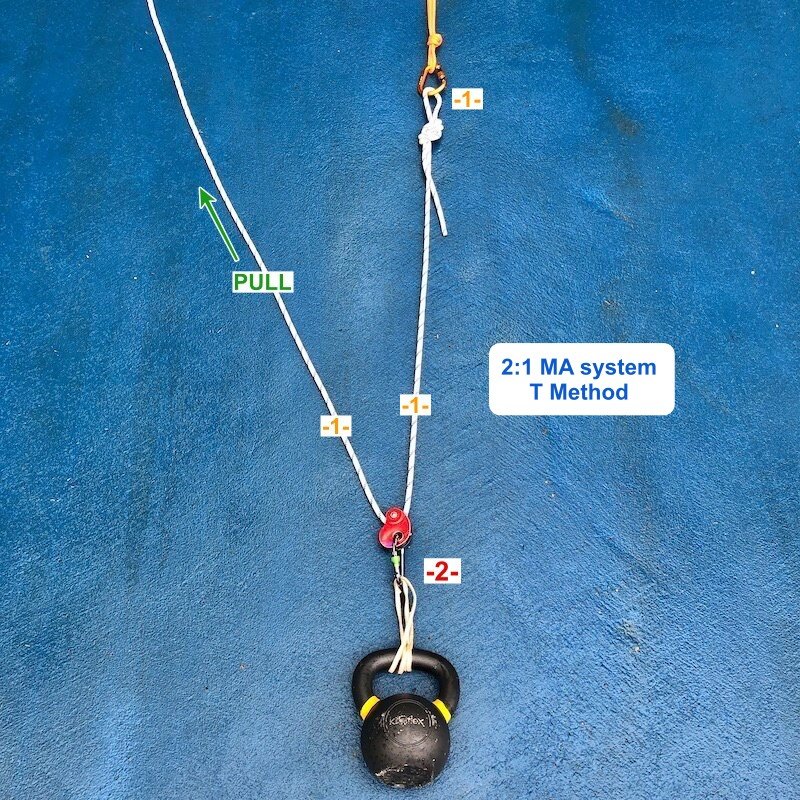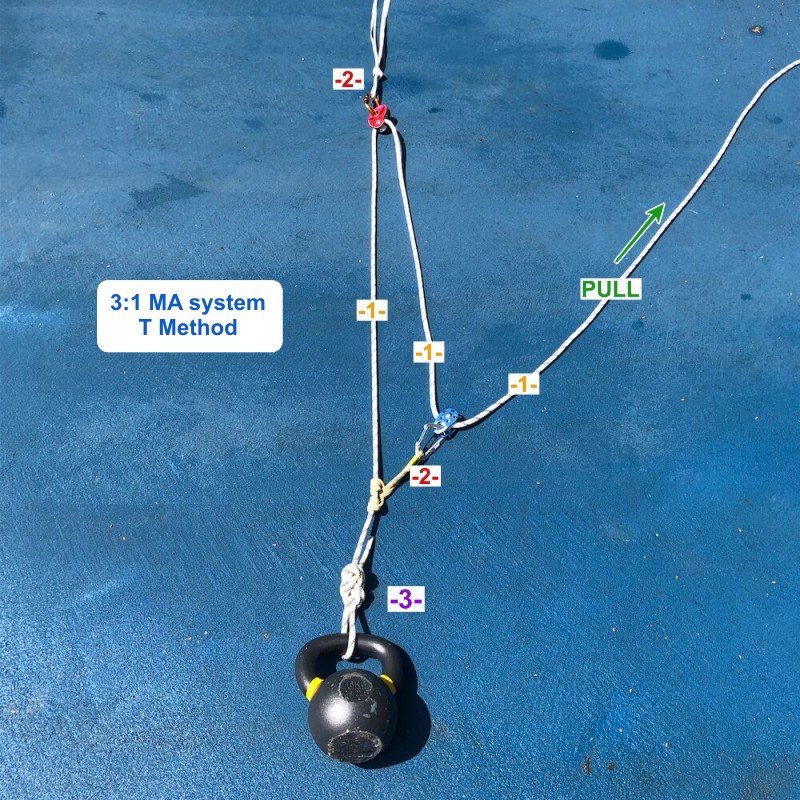
Alpine Tips
Using the “T method” to calculate mechanical advantage
It's easy to get crosseyed looking at a pulley system and trying to figure out the mechanical advantage. Fortunately, there's an easy way to calculate it, requiring the math skills of a third grader. (Yes, you can do this.) Let’s learn the “T method.”
Premium Members can read the entire article here:
For climbers, mechanical advantage (MA) systems are used in self rescue, and in big wall climbing to lift heavy haul bags. They're also helpful for getting your truck out of the ditch, pullings stumps in your garden, hoisting sails on a boat, building pyramids, and other useful life applications.
Even if you have a basic understanding of how they work, some of the more esoteric ones make most folks (like me) get cross-eyed counting all the strands and trying to figure out the MA!
Fortunately, there is a pretty straightforward way to figure out the theoretical MA of any system, using math that you learned in the third grade: The T method.
The method assigns a T (Tension) value to each rope segment. You add up the tensions at various points in the system to determine the overall mechanical advantage.
It's particularly useful for more complicated systems beyond a basic 2:1 and 3:1.
Here’s how the T method works.
Start with “1”. Begin with a value of 1 “tension” at the point where you pull on the rope. Think of tension as how much force you (and maybe your pals) are pulling on the haul strand.
Follow the tension. Trace the tension through each pulley and other components of the system.
Adding the tensions:
At each pulley (aka change of direction), the tension on the rope entering and exiting the pulley is EQUAL.
At the pulley “eye” (aka, the thing the pulley is clipped to) the tension is the SUM of the tension on the rope entering and exiting the pulley. For example, if 1 tension enters the pulley, then 2 tensions are applied to whatever the pulley is clipped to. If 2 tensions enter the pulley, then 4 tensions get applied to the pulley clipping point.
When tensions join (e.g., at a prusik hitch), you ADD the values.
Mechanical advantage:
The final tension value at the load is the mechanical advantage of the system.
Does this sound a bit dry and complicated? That's how I felt when I first heard of it.
But, after you try it a few times, it's quite simple. If you're even slightly a mechanical advantage nerd like I am, it's actually kind of fun!
Let's look at some examples of a 2:1, 3:1, and a 6:1.
Let's start with the easiest system, a 2:1 (aka the “C pull”)
To move the load 1 meter, you need to pull 2 meters of rope through the system.
In a theoretical frictionless world, you could lift a 100 kg load by pulling with about 50 kg of force.
(Note: in this example, the progress capture pulley is attached to the load, not the anchor.)
Begin with an input of 1, you pulling on the rope.
That input force of 1 is doubled to 2 when it changes direction at the red progress capture pulley. That gets applied to the load.
The input force of 1 comes out the other side of the red pulley, remaining at 1, and then goes onto the anchor.
Summary of a 2:1 MA system:
2 units of tension go to the load.
When you’re pulling, 1 unit of tension goes to the anchor.
Got that? Good, let’s look at a 3:1 system (aka the “Z pull”)
To move the load 1 meter, you need to pull 3 meters of rope through the system.
In a theoretical frictionless world, you could lift a 100 kg load by pulling with about 33 kg of force.
Begin with an input of 1, you pulling on the rope.
That input force of 1 is doubled to 2 when it changes direction at the blue pulley. That gets applied to the prusik that the pulley is clipped to.
The input force of 1 comes out the other side of the blue pulley remaining at 1. That travels to the red progress capture pulley on the anchor, where it's doubled to 2.
The input force of 1 continues at the left side of the red pulley down toward the load. Here it says “hello!” to the yellow prusik, which has a force of 2.
We add these together to get 3, the force applied to the load.
Summary of a 3:1:
3 units of tension go to the load.
When you’re pulling, 2 units of tension go to the anchor.
OK, you got all that? Sweet! Let's step it up to a 6:1.
In this example, we’ll start with a 3:1 Z drag, and then make a 2:1 C pull (with a separate cord) on top of it. This rigging is also known as a “C on a Z”.
To move the load 1 meter, you need to pull 6 meters of rope through the system.
In a theoretical frictionless world, you could lift a 100 kg load by pulling with about 17 kg of force.
How want to learn how to apply the T method to figure out a 6:1?
What's the difference between theoretical and real world MA?
How can real world MA improve by using pulleys in different places?
How about a link to a great YouTube video that describes the T method in even more detail than this?
Join my Premium Membership to read the rest of the article.
Thanks for your support.
Load transfer: The stirrup hoist
Do you have a big load that you need to move a short distance? Here's one crafty way to do it: the stirrup hoist. This may not be the most efficient method, but it's quick and simple.
Premium Members can read the entire article here:
This is part of a series of articles that cover methods to move a large load a short distance, typically to unweight an anchor.
In some unusual climbing situations, you may need to lift a very large load a very small distance.
Maybe on a big wall, where you rigged your bags old school style (sheesh, use a docking cord, will ya!?) and you need to lift them a tiny bit to unclip the carabiner.
Maybe in a rescue scenario, when you have an unconscious person hanging off of a loaded anchor, and you need to lift them just enough to unclip them.
In either case, it's often better to use your bodyweight to try to do the lifting rather than your muscles. Work smart, not hard!
Don't make a habit out of this. It's almost always better to use some sort of releasable knot or hitch to anchor your load when you can. But for those cases when you didn't do that for some reason, the stirrup hoist might come in handy!
Here's a way to set that up, called the stirrup hoist.
This is not the most efficient method, but it's pretty fast and uses minimal gear, so it's a good one to have in the toolbox.
You might want to try this first and see if it solves your problem, before you try more elaborate systems, such as the alpine block and tackle, or the 2:1 redirected haul.
Clip a long sling onto the load. Slippery Dyneema would be a good choice, to minimize friction.
Pass the sling through a carabiner on the anchor, and let the sling hang down below the anchor. If you happen to have a pulley, run the sling through that to minimize friction. (In the photo below, I’m not using a pulley.)
Step into this “stirrup”. Your body weight, along with lifting the load with your arms, should hopefully be enough to move it up a bit to solve your problem.
To give a little extra boost, you might try bouncing on the sling ,which will apply more force to the load than your static body weight.








